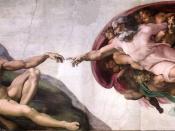"What roles do myths of origin play within religion and society?"
Contents
Introduction
The Hebrew Bible / Old Testament Creation Myth
Unity versus Disunity
Explanation versus Paradox
Oppression versus Liberation
The New Testament Creation Myths
Their role in religion
Their role in society
Conclusion
Bibliography
Introduction
What is myth? For rationalists such as Muller, they provide pre-scientific explanations of natural phenomena. For functionalists such as Malinowski they are a "codification of belief", explaining rites and justifying norms. For Jung, myth provides expressions of a collective unconscious. Barthes studied the process of mythification, Levi-Strauss' structuralists studied the structure of myths and form critics led by Bultmann advocated demythologising.
This essay will compare myths of origin in the Hebrew Bible / Old Testament and the New Testament. The cosmogonic myth of the Genesis creation narrative (Gen 1-3) has interwoven yet often paradoxical roles in Judaism, Christianity and society. The myths of origin of Jesus (Mt. 1:1-4:11, Mk 1:1-13, Lk.
1:5-4:13, Jn 1:1-34), however, have very different roles in religion and society. This essay will seek to examine what this reveals about the nature of myths of origin.
The Hebrew Bible / Old Testament Creation Myth
Unity versus disunity
The Priestly section (1:1-2:4) of the Genesis myth reveals much about the character and creativity of God. He is eternal, pre-existing all things and omnipotent . He is transcendent, hovering over the waters , yet immanent, speaking directly to Adam and Eve . He created the world and saw that it was good . He created humans , male and female in his image and likeness, and saw that it was very good . On these points, Judaism and Christianity agree.
What does it mean to have been created in the image of God? What, therefore, does it mean to be human?...


